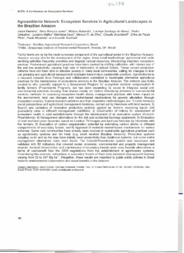Agroambiente network: ecosystem services in agricultural landscapes in the Brazilian Amazon.
Agroambiente network: ecosystem services in agricultural landscapes in the Brazilian Amazon.
Autoria: FERREIRA, J. N.; BRIENZA JUNIOR, S.; BATISTELLA, M.; ABREU, L. S. de; CELESTINO FILHO, P.; MATTOS, L. M. de; XAUD, M. R.; SILVA, M. R. da; BUSCHINELLI, C. C. de A.; PINTO, E. de P.; MOUTINHO, P.; STACHETTI, G.
Resumo: Family farms are by far the most numerous component of the agricultural sector in the Brazilian Amazon. However socially vital for the development of the region, these small landholdings? agricultural and cattle ranching activities frequently overdraw and degrade natural resources, threatening important ecosystem services. Predominant agricultural practices have been marked by shifting cultivation, with intense use of fire and low productivity, causing high rate of destruction of natural forests. These current production patterns have not been able to alleviate poverty in many local communities, calling for changes in land use planning and agricultural management strategies toward more sustainable practices. Agroambiente is a research network from Embrapa and collaborators committed to investigate alternative agricultural practices for the maintenance of ecosystems services in the Brazilian Amazon. The network was firstly created to offer scientific support to a Government Program for ecosystem services compensation to family farmers (Proambiente Program), but has been expanding its scope to integrate social and environmental scientists focusing their studies mainly on: factors influencing provision of environmental services; methods for assessing ecosystem health status; management practices with lower impact on the environment; land use changes and market-based mechanisms for poverty alleviation through ecosystem services. Current research activities and their respective methodologies are: 1) Links between social perspectives and agricultural management decisions, carried out by interviews with land owners; 2) Search and validation of innovative production systems applied by farmers assessing inputs and productivity rates in different management conditions; 3) Construction of indices for assessment of ecosystem health in rural establishments through the development of an evaluation system (Ecocert- Proambiente); 4) Management alternatives for fire risk and accidental burnings abatement; 5) Evaluation of land use/land cover dynamics based on Landsat TM images and land use histories by interviews with the farmers; 6) Evaluation of carbon sequestration potential by estimating carbon stocks in different compartments of secondary forests; and 6) Appraisal of available market-based mechanisms for carbon schemes. Some rural communities have already been involved in sustainable agriculture practices such as agroforestry systems and fair trade (e.g. south western Brazilian Amazon). Production systems adopting no-till and no-fire may have initially lower productivity than traditional systems, but some viable management alternatives have been found. The Ecocert-Proambiente system was developed and validated with 62 indicators that covered social, economic, environmental and property management aspects. Avoided deforestation and maintenance of secondary forests were more feasible alternatives in terms of cost-benefit than the CDM negotiations from the establishment of agroforestry systems. Considering this scenario, estimatives in secondary forests of Pará state indicated aboveground biomass varying from 22 to 247 Mg ha-1. Altogether, these results are important to guide public policies in Brazil towards environmental conservation and social benefits in the Amazon.
Ano de publicação: 2008
Tipo de publicação: Resumo em anais e proceedings
Unidade: Embrapa Amazônia Oriental
Palavras-chave: Agricultura, Agroambiente, Amazonia, Sistemas dinâmicos, Tomada de Decisão
Observações
1 - Por padrão são exibidas publicações dos últimos 20 anos. Para encontrar publicações mais antigas, configure o filtro ano de publicação, colocando o ano a partir do qual você deseja encontrar publicações. O filtro está na coluna da esquerda na busca acima.
2 - Para ler algumas publicações da Embrapa (apenas as que estão em formato ePub), é necessário ter, no celular ou computador, um desses softwares gratuitos. Sistemas Android: Google Play Livros; IOS: iBooks; Windows e Linux: software Calibre.
Acesse outras publicações
Acesse a Base de Dados da Pesquisa Agropecuária (BDPA) para consultar o acervo completo das bibliotecas da Embrapa.

